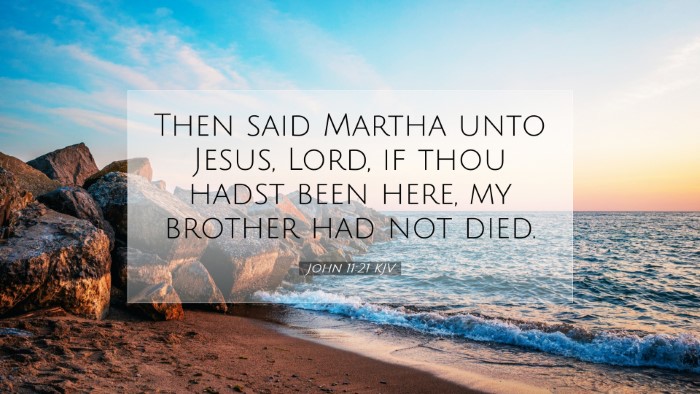Commentary on John 11:21
John 11:21 records the poignant moment when Martha confronts Jesus after the death of her brother, Lazarus. The verse reads: "Then said Martha unto Jesus, Lord, if thou hadst been here, my brother had not died." This statement encapsulates profound themes of faith, sorrow, and the human condition.
Contextual Analysis
This event occurs in the broader context of the raising of Lazarus, highlighting Jesus' authority over life and death. Martha's confession reflects her deep grief and faith, recognizing Jesus' power to heal despite her sorrow.
Martha's Faith
Martha’s declaration showcases a duality of belief and doubt. According to Matthew Henry, Martha recognizes Jesus as a healer but struggles with the timing of His arriving, implying that His absence contributed to her brother’s death. This indicates a common human tendency to question God's timing and presence during trial.
Theological Implications
Martha’s words point towards a profound theological truth about the nature of Christ and the sovereignty of God in human suffering. Albert Barnes notes that her statement is not merely an accusation, but a recognition of Jesus' potential—if only He had been there, death could have been avoided. This echoes the sentiments of believers today grappling with grief and loss, making Martha's experience relatable.
The Role of Grief
-
The Universal Experience of Grief:
Grief is a shared experience, and Martha’s lament serves as a representation of the natural human response to loss. Adam Clarke emphasizes that grief can lead individuals to question their faith, showcasing the struggle between trust in God's goodness and the pain of loss.
-
Turning to Jesus:
Despite her sorrow, Martha turns to Jesus, embodying a model of faith amidst pain. This act of approaching Jesus—though marked by despair—offers a source of hope and a pathway to healing.
The Essence of Belief
Martha's statement also raises a question about belief and understanding the character of Christ. Matthew Henry points out that her encounter with Jesus ultimately deepens her faith. She acknowledges Jesus' capabilities, recognizing that His presence—who He is—has the ultimate power over death and life.
Community and the Value of Dialogue
This encounter emphasizes the need for community in grief. Martha openly expresses her feelings to Jesus, highlighting the significance of dialogue during times of crisis. Albert Barnes suggests that sharing our doubts and grievances with Christ can lay the groundwork for deeper revelations and healing.
Conclusion
In John 11:21, Martha's statement serves as a lens through which we can examine our own doubts, beliefs, and experiences of grief. As we reflect on this verse, we are reminded of the importance of expressing our sorrow to Christ and acknowledging His sovereignty in our lives. The interplay between despair and faith invites us into a richer understanding of who Jesus is—the source of hope that transcends death itself.
Ultimately, John 11:21 provides profound insights into the struggles of faith experienced in the face of loss, making it a vital text for study and reflection among pastors, students, theologians, and Bible scholars.


